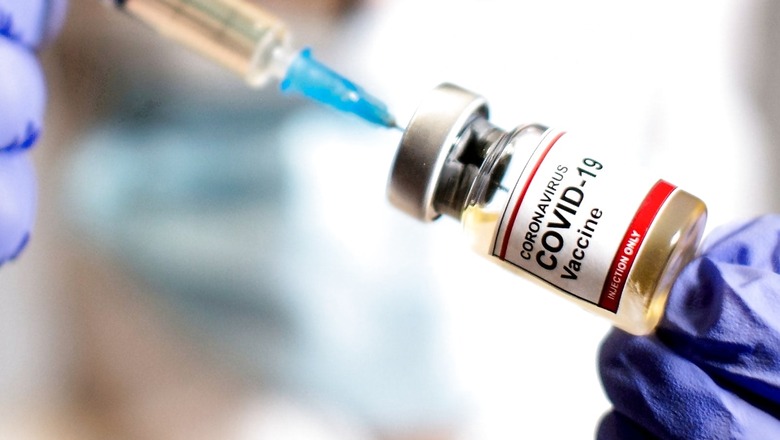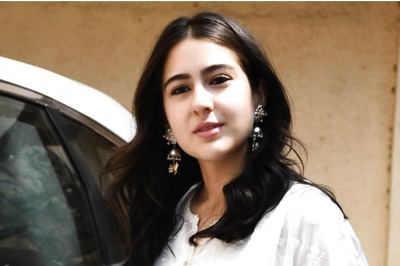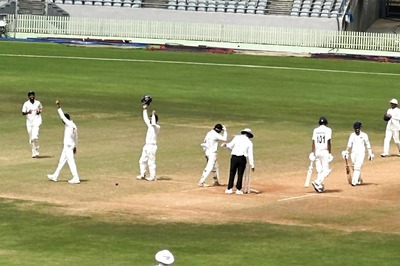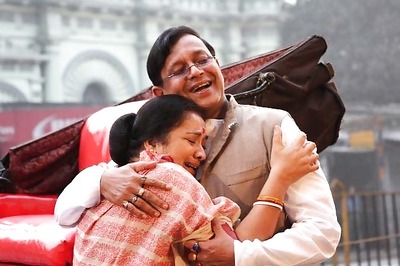
views
As India marches steadily in its inoculation mission, clamour to administer booster shots to its vulnerable population and health workers has been growing steadily from political leaders. On Friday, the Rajasthan government convened an emergency meeting of officials concerned after the state registered a Covid death, after over three months.
During the meeting, which was chaired by Chief Minister Ashok Gehlot, measures to curb the rising cases were discussed. However, according to officials, not only regular Covid vaccination, but Gehlot also explored the possibility of applying a booster dose of the Corona vaccine to his state population and aims to write a letter to the Prime Minister in this regard as well.
After the review meeting, Gehlot said: “We have decided to write to the Prime Minister to allow the third booster dose of Corona vaccine. After a year, now the booster dose is required to check the third wave. Will write to the PM to consider and approve the booster dose. Booster doses have been started in many countries. The Centre should arrange for it,” he said.
“Corona is spreading fiercely in Europe and Russia. Even beds are not available in countries like Germany and Russia. The WHO has said that 5 lakh people can die in Europe due to it. There is a belief that when Corona hits Europe, it comes to Asia after two months. The number of Corona has increased here too, so we have called a review meeting,” he added.
Booster Shots For Vulnerable Population
Facing the prospects of a probable Third Covid-19 wave is the most difficult challenge for both centre and state governments. Therefore, state governments, especially those which had struggled to combat the second wave, have already begun urging the central government for booster doses for their vulnerable population at the very least.
Maharashtra government, earlier this week, urged the Centre to prioritise a booster jab of Covid vaccine to all healthcare workers.
Maharashtra Health Minister Rajesh Tope made the suggestion to Union Minister of Health & Family Welfare Mansukh Mandaviya at their meeting in the capital. Besides the booster jabs to the healthcare workers, Tope urged the Central government to roll out the vaccination programme for children below 18 year of age as early as possible.
While Maharashtra has shown a declining graph of Covid-19 new cases and fresh fatalities, the state government is not taking any chances and is on high alert to tackle the potential Third Wave if it strikes.
Not Just Government But Medical Boards Too Call for Booster Doses
Previously, the Indian Medical Association has called for a booster dose for healthcare workers across the nation. The IMA said that after the union government’s clarification pertaining to the fact that a policy document on booster dose is underway, IMA has also consolidated its stand on the booster dose for healthcare workers and other high-risk citizens across the country.
Dr J.A. Jayalal, National President, IMA, had previously remarked, “The booster dose for healthcare workers was initially desirable and we were not demanding it. But now we demand that healthcare workers should be given a booster dose as ample vaccine stock is available”. The IMA said that as of now the vaccine production has been augmented and availability of vaccine has also been increased.
IMA President said, “IMA demands the union govt to prioritize vulnerable population including healthcare workers and immuno-compromised citizens and permit them to take their third dose”. He added that the third dose needs to be given on a priority basis in India.
The IMA has also demanded that vaccination should be promoted for all people with diabetes and if needed, third dose of vaccine should also be given to them. “In this Covid era as Diabetic people are more prone and vulnerable to serious Covid complications, IMA demands the vaccination should be promoted for all Diabetes people and if needed third dose of vaccination should be also given to them”, said IMA in a statement.
Hyderabad-based pharma major Bharat Biotech founder and Managing Director Dr Krishna Ella also agreed with what IMA had to say about the booster dose. Ella said that an ideal time for a booster dose of a coronavirus vaccine would be six months after receiving the second dose.
However, he added that a final decision will be taken by the government.
Is it Already Time for Booster Doses In India?
“The need for a booster dose in India is probably not immediate, especially when we still have a considerable population unvaccinated and vaccine availability is not far in excess of the immediate requirement,” Dr Veena P. Menon, Professor, Department of Clinical Virology, Amrita School of Medicine, told IANS in an interview last month. Menon added that since a significant percentage of the population has some degree of infection acquired natural immunity, “a third dose for the general population is certainly not warranted at present”.
“There is a huge vaccination gap when millions are not able to get even the first vaccine shot. India isn’t lagging, we are just more focused on how this huge vaccination gap can be reduced. If we see the differences between the two doses — people vaccinated with a single dose are not taking the second dose on time and are avoiding being fully vaccinated,” added Dr Sameer Bhati, Public Health Expert, Member Vaccination Awareness Committee, and Director at Star Imaging Path Labs.
The same has also been echoed by scientists at the Indian Council of Medical Research (ICMR) who have not approved a booster dose yet. For India, a booster dose is not the central theme at the moment and getting two doses remains the major priority, media reports quoted Indian Council of Medical Research (ICMR) Director-General Balram Bhargava as saying.
Eminent scientist and biochemist Prof G. Padmanaban had previously told IANS that India may require the third dose of Covid vaccine by the middle of next year, as breakthrough cases even after full vaccination have been prevalent, even though mostly mild.
Is A Booster Shot Necessary For Everyone?
According to doctors, people, especially those vulnerable to the Covid-19 infection in India, should be mentally prepared to take a booster dose of the Covid-19 vaccine to protect themselves from new variants and help complete the fight against the virus.
While India is on track to fully vaccinate its adult population, advanced nations like the US are already administering booster doses to ensure new variants of the Covid-19 virus does not mutate and emerge into a major cause of worry. Doctors presume there could be newer varieties of this virus that would germinate in society, and vulnerable groups must be prepared to take a booster dose of the vaccine to ensure the fight against the virus is complete.
“According to various studies, immunity against coronavirus developed by vaccination might wane over time. While the younger and healthy sections of the population might have a lower risk, those in the high-risk category must be well prepared to tackle the danger. Many in India took their second dose more than six months back, which is a considerable time to reassess antibodies levels among them. No vaccine manufactured to date has assured 100 per cent protection against this virus, and like in the West, Indians too must be prepared to take an additional booster dose if necessitated,” said Dr. M Sai Sudhakar, Chief Interventional Cardiologist, Gleneagles Global Hospital.
While research into the efficacy of Covid-19 vaccines longer-term is still being carried out, there has been some suggestion that protection levels against infection begin to deteriorate after around six months, although levels of protection against serious illness from the virus decline at a slower rate. According to Britain’s ZOE Covid-19 study, the effectiveness of the Pfizer jab against infection in the months after the second dose fell from 88 per cent to 74 per cent at around the five to six-month mark. For those who received the AstraZeneca jab, protection levels against infection fell from 77 per cent to 67 per cent in the same period.
“The existing evidence suggests that the vaccines administered currently are holding up extremely well to protect against severe disease, hospitalization, or even death. Though there is no strong evidence leading to a need to provide a third dose for people who have already been vaccinated; there is nothing wrong in staying mentally prepared to take a third dose as and when the healthcare community feels a large section of the population would require a booster dose to protect against a possible spread of virus in future,” said Dr. Aarathi Bellary, HoD – Internal Medicine, SLG Hospitals.
According to Dr. Suresh Reddy, Consultant Neuro Physician, Aware Gleneagles Global Hospital, those who are seriously immunocompromised might be at a high risk of suffering more due to coronavirus infection, even after taking two doses of Covid-19 vaccine.
“Such people need extra care and constant medical attention to ensure the risk is mitigated to the best possible extent. These high-risk category or seriously immunocompromised people must surely be prepared to take a booster dose as and when the scientific and medical fraternity feel it is time,” he said
“Vaccines are being administered for the past eight months in India, and there is a popular belief that the efficacy of Covid-19 vaccination might wane after a certain period. While India is yet to vaccinate more than 20 per cent of the adult population even once, there is nothing wrong in talking about booster dose and even preparing ground for the same. The booster dose will help extend the protection gained from the first two doses and provide a longer-term protection,” concluded Dr. Aravindan Selvaraj, Co-Founder & Executive Director, Kauvery Hospital, Chennai.
(With Inputs From IANS)
Read all the Latest India News here



















Comments
0 comment